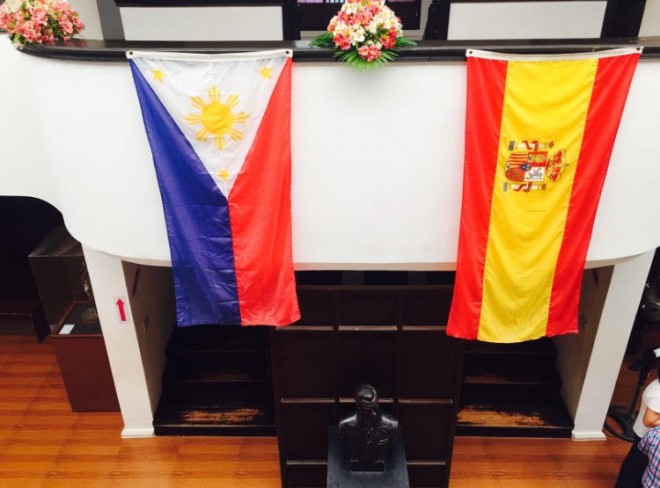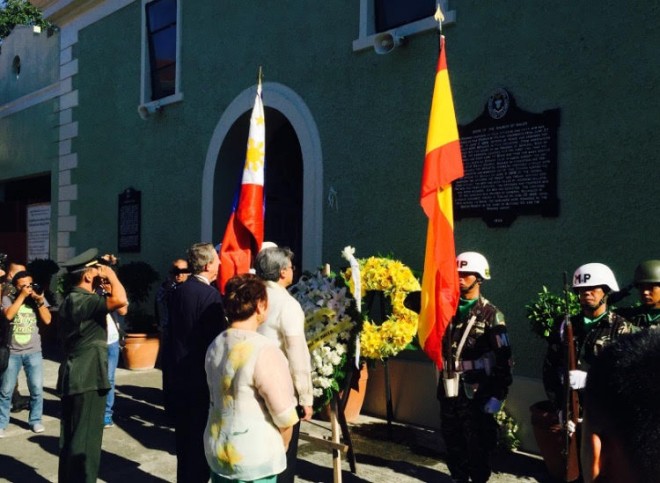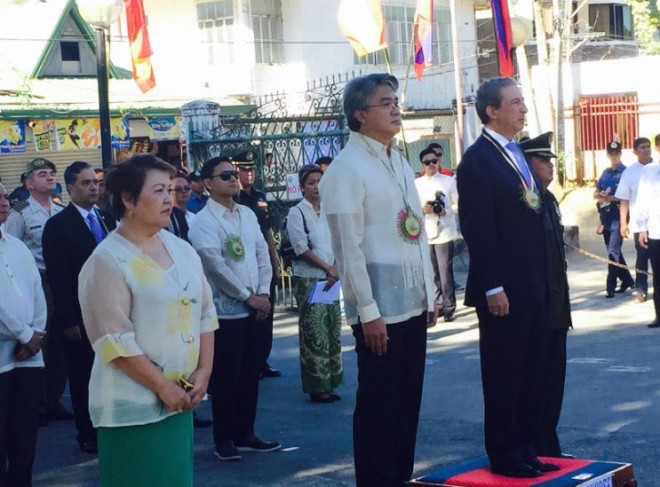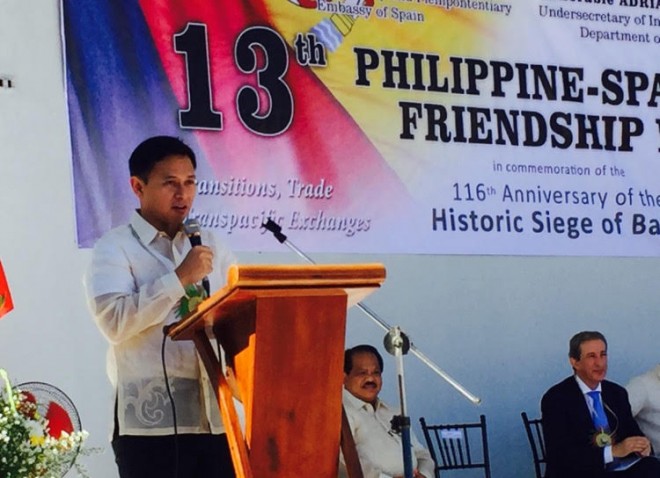After centuries-long colonial rule, PH, Spain ‘partners for life’

The Philippine and Spanish flags hang freely above the bust of the late Commonwealth President Manuel Quezon at Museo de Baler in celebration of the 13th Philippine-Spanish Friendship Day.
BALER, Aurora, Philippines—More than friends, partners for life.
This was how Sen. Juan Edgardo “Sonny” Angara described the relationship between the Philippines and Spain during the celebration of the 13th Philippine-Spanish Friendship Day here on Tuesday.
“Through the centuries, primarily via the galleons and the galleon trade, Filipinos and Spaniards ended up sharing ideals and aspirations, cultures and traditions,” Angara said.
Angara said the Spanish colonial rule in the Philippines, which lasted for more than three centuries, had paved the way for stronger cultural and economic relations between the two countries.
“In the midst of conflict, we choose to uphold honor and camaraderie. And up to today, we choose to foster connections rather than sever them,” he added.
Article continues after this advertisementEchoing Angara, Baler Mayor Nelianto Bihasa said wounds of the past had already healed, noting “the fiercest of friends have become the sweetest of friends.”
Article continues after this advertisement“Just like the Filipino insurgents who gave the Spanish garrison members a safe passage to the Sierra Madre, the Filipinos of today stand on their ground but not to fight anymore but to welcome our Hispanic friends in this venerable celebration,” Bihasa said.
Spanish Ambassador to the Philippines Luis Calvo said the changes in relationship between the former colony and its colonizer can only be sustained by “real brothers,” owing to powerful historical dynamics.
Citing Spain’s recovery from economic crisis due to new emerging markets such as the Philippines, and the latter’s opening up to foreign investments, Calvo said the mutual support between the two former rival nations can be best seen in their tighter bilateral ties.
“All of these remain reflected in the number of bilateral dealings between our countries, but above all, in the significant number of Spanish companies interested in doing business in the Philippines and contributing to its permanent modernization,” he said.
Angara supported the envoy’s claims, saying that in 2013, the official development aid from Spain had amounted to $63.298 million, with the bilateral trade between the two countries reaching $469.8 million or about P21.2 billion.
Both Angara and Calvo highlighted the cultural assistance that Spain had been extending to the Philippines, particularly with the conservation of architectural heritage sites.

The 13th Philippine-Spanish Friendship Day begins with wreath-laying ceremonies at Baler Church, the site of the historic Siege of Baler.
“The Spanish government has invested heavily in helping us rebuild our heritage sites particularly through Escuela Taller de Filipinas,” Angara said. “Through their continued help, not only have we rebuilt Intramuros to make it a more vibrant tourist spot, we have also provided much needed employment for many of our out of school youth.”
Aside from cultural and economic ties, the senator added the Philippine government should also partner with Spain in terms of tourism and agriculture, saying the European country recorded tourist arrivals larger than its population and had been a net exporter of agricultural goods in the region.
Common heritage
Trade Undersecretary Adrian Cristobal, who led the wreath-laying ceremonies at Baler Church with Calvo, said Spain’s relationship with the Philippines had already “gone beyond mercantilism” owing to a “common heritage forged centuries ago.”
“Trade is not only the exchange of silver for silk, but also of knowledge and values,” he said.
Calling the Philippines the “gateway to Asia,” Cristobal also urged other nations to considering investing in the country: “We believe our time is now.”
“All we need to do is to rekindle once more our friendship with a common noble purpose of uplifting our people from poverty and improving their quality of life,” he added. “With the courage, determination and compassion of the heroes who brought us here today, we cannot fail.”
The 13th Philippine-Spanish Friendship Day coincided with the 116th anniversary of the historic Siege of Baler, wherein Spaniards who refused to surrender by the end of the Philippine Revolution barricaded themselves for 11 months or 337 days in the Baler Church. According to narratives, some Filipinos provided food for the Spanish soldiers during the almost-yearlong siege, and even welcomed them with cheers and healed their wounds upon surrender.

From left: NHCP Chair Maria Serena Diokno, Sen. Sonny Angara, Trade Undersecretary Adrian Cristobal, and Spanish Ambassador Luis Calvo
The ceremonies at the Plaza de Baler were also graced by National Artist F. Sionil Jose, National Historical Commission of the Philippines chair Maria Serena Diokno, Aurora Rep. Bellaflor Angara-Castillo, and members of the diplomatic corps. The festivities were capped by a trip to Baler Museum and Dicasalarin Cove.
The Philippine-Spanish Friendship Day, which was enacted by former Sen. Edgardo Angara, is celebrated every June 30 “to remember the act of benevolence which has paved the way in bridging better relations between Philippines and Spain.”
“The Philippine-Spanish Friendship Day, if anything, is a celebration between equals who aim to stare down the challenges they currently face and to leverage the many opportunities presented to them,” the younger Angara added.
